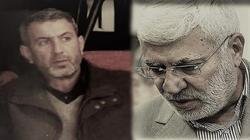 Iraq’s Popular Mobilization Units (PMU) appointed Abu Fadak al-Mohammedawi as the new deputy commander of Hashd al-Shaabi following the martyrdom of his predecessor Abu Mahdi al-Muhandis, who was killed in a US drone attack last month.
Iraq’s Popular Mobilization Units (PMU) appointed Abu Fadak al-Mohammedawi as the new deputy commander of Hashd al-Shaabi following the martyrdom of his predecessor Abu Mahdi al-Muhandis, who was killed in a US drone attack last month. RNA - According to PMU official Abu Ali al-Bassari, the Popular Mobilization Units chose Abu Fadak based on a decision made at a recent meeting of its board, presstv reported.
“Following the appointment, the chief-commander of the Iraqi armed forces will sign Abu Fadak’s decree in the next couple of days,” he added.
Al-Mohammedawi earlier served as the secretary-general of Kata’ib Hezbollah. Since joining the founding core of Kata’ib Hezbollah in 1997, he has been a prominent figure, even though his real name is not known to the public.
“Abu Fadak is strong and a true leader with honorable positions and good relations with all,” an Asa’ib Ahl al-Haq commander stated earlier.
Known as the “uncle”, Abu Fadak is praised for his military prowess and confidence. He was reportedly close to al-Muhandis.
Al-Muhandis, along with late anti-terror Commander of the Qods Force of Iran’s Islamic Revolution Guards Corps (IRGC) Lieutenant General Qassem Soleimani and a number of their comrades, was assassinated in a US drone attack near the Baghdad International Airport on January 3, 2020.
The People’s Mobilization Units (PMU) of Iraq, better known by the Arabic name Hashd al-Shaabi, is a government-sponsored umbrella organization composed of around 40 factions of volunteer counter-terrorism forces, including mostly Shia Muslims besides Sunni Muslims, Christians and Kurds.
The PMU’s formation goes back to the summer of 2014, shortly after Daesh (also known as ISIL or ISIS), the world’s most notorious Takfiri terror group, showed its face and managed to occupy swathes of territory in Iraq. The lightning gains made by the foreign-backed terrorists caught the national army of Iraq off guard, pushing government forces to the verge of collapse and leaving the Arab state in disarray.
In mid-June that year, Iraq’s prominent Shia cleric Grand Ayatollah Ali al-Sistani intervened to help rebuild the national army, issuing a fatwa that called on all Iraqi people to join forces with the army in the face of the Daesh threat.
The historic fatwa led to a mass mobilization of popular volunteer forces under the banner of Hashd al-Shaabi. The force then rushed to the aid of the army and took the lead in many of the successful anti-terror operations, which ultimately led to the collapse of Daesh’s territorial rule and the liberation of the entire Iraqi land in December 2017.
The PMU’s efficient role in the Takfiri outfit’s defeat turned the force into a permanent and broadly-popular feature of Iraq’s social, political and security landscapes, despite attempts by the US and its allies to depict the PMU’s mission as sectarian in nature.
In November 2016, the parliament recognized Hashd al-Shaabi as an official force with similar rights as those of the regular army, therefore legally establishing it as part of the national armed forces.
847/940